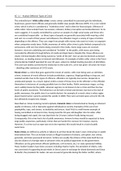AC 1.1 – Analyse Different Types of Crime
The umbrella term ‘white collar crime’ covers crimes committed for personal gain by individuals,
businesses, government officials and generally middle-class people (Browne 2009). It is a non-violent
crime, which is why it is considered a “victimless crime” and is often for financial gain. Offences of
white collar crime include fraud, tax evasion, collusion, bribery/corruption and embezzlement. As its
name suggests, it is usually committed by a person or people of a high social status and those who
are considered respectable – as these types of people are generally associated with wearing a shirt
and suit. As a result of their power and influence, the offenders target a variety of types of victims
depending on the offence. They can range from people with money who want to invest, to taxpayers
when companies evade taxes. Public awareness of white collar crime is quite limited compared to its
seriousness, with very few stories being covered in the media. Some large cases are covered,
however, most are underlying and considered “invisible” to the public, with many cases being
concealed by offenders through bribery of media and legal teams. Despite this, these offences are
clearly criminal despite often being named as “perks of the job”, but can also be deemed as deviant
behaviour, as stealing money is immoral and dishonest. An example of white collar crime is the Ponzi
scheme Bernie Madoff operated for over 20 years, where he robbed trusting investors of $65 billion.
This case was widely covered by the media due to the scale of it, as he was given 150 years for fraud
– dwarfing other sentences of 24/25 years.
Moral crime is a crime that goes against the morals of society, with most being seen as victimless
crimes. Instances of moral offences include prostitution, vagrancy, illegal gambling or drug use, and
assisted suicide. Due to the types of offences, offenders are typically low income, desperate or
uneducated people. As a result, typical victims consist of those close to the offender or the offender
themselves in instances of causing possible harm to their bodies. Public awareness ranges, as drug
use is widely known by the public, whereas vagrancy is not known to be a crime and thus has low
levels of public awareness. This behaviour can be both criminal and deviant, but due to the lack of
public awareness, the public view it as mainly deviant. An example of a moral crime is when rugby
player Daniel James’ parents assisted his suicide in 2008. They were arrested upon arrival in the UK,
but ultimately escaped any charges.
Described as crimes involving moral turpitude, immoral crime is characterised as having an inherent
quality of vileness, evil or depravity against individuals or society. Examples of this vary from
paedophilia, rape, and slavery, to bestiality and torture. Josef Fritzl is a well-known example of
having committed an immoral crime, having lured his 18-year-old daughter into his cellar. After
being drugged and raped, she was kept there for 24 years, before finally being rescued.
Consequently, this crime had a lot of public awareness. Immoral crimes would be expected to have
large public awareness, particularly crimes that are harder the conceal, for instance, slavery.
However, if a crime such as rape was not to be reported, this would result in a lack of public
awareness.
State crimes are defined as activity or failures to act that break the state’s own criminal law or public
international law. This can include torture or illegal treatment of citizens, corruption, war crimes,
genocide, and state sponsored terrorism. Victims are usually the citizens of the state itself but can
also be citizens of a foreign state or prisoners who are political opponents to the government.
Offenders can be government officials (politicians, civil servants, etc.) or state sponsored militias.
Many modern leaders have been accused, including Charles Taylor, the president of Liberia, who
was convicted of supporting brutal rebels in Sierra Leone in exchange for blood diamonds and Omar
Al-Bashir, the president for Sudan. He was accused of genocide during the Dafur conflict, where





